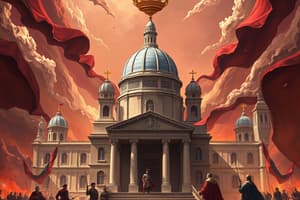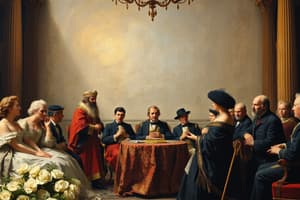Podcast
Questions and Answers
What is a potential consequence of a cruel and brutish monarch?
What is a potential consequence of a cruel and brutish monarch?
Which of the following best defines an oligarchy?
Which of the following best defines an oligarchy?
What is a common negative perception associated with oligarchies?
What is a common negative perception associated with oligarchies?
How do wealthy families influence political representation in the US, according to some economists?
How do wealthy families influence political representation in the US, according to some economists?
Signup and view all the answers
What happens if a royal bloodline is eliminated in a monarchy?
What happens if a royal bloodline is eliminated in a monarchy?
Signup and view all the answers
Which country is cited as an example of an oligarchy where wealthy individuals control politics?
Which country is cited as an example of an oligarchy where wealthy individuals control politics?
Signup and view all the answers
What criticism has been made about the democratic nature of the US?
What criticism has been made about the democratic nature of the US?
Signup and view all the answers
What is a significant characteristic of oligarchies that differentiates them from other governments?
What is a significant characteristic of oligarchies that differentiates them from other governments?
Signup and view all the answers
What is a key principle of socialism regarding the value of a worker's contribution?
What is a key principle of socialism regarding the value of a worker's contribution?
Signup and view all the answers
Which of the following is NOT considered a characteristic of socialist ideals?
Which of the following is NOT considered a characteristic of socialist ideals?
Signup and view all the answers
Who is known for further developing socialist ideas into practical governance after the Bolshevik Revolution?
Who is known for further developing socialist ideas into practical governance after the Bolshevik Revolution?
Signup and view all the answers
What is the main argument against capitalism as presented in the content?
What is the main argument against capitalism as presented in the content?
Signup and view all the answers
Which of the following best describes a codified constitution?
Which of the following best describes a codified constitution?
Signup and view all the answers
What distinguishes India's Constitution in terms of its authority?
What distinguishes India's Constitution in terms of its authority?
Signup and view all the answers
How did early capitalist economies contribute to social concerns according to the content?
How did early capitalist economies contribute to social concerns according to the content?
Signup and view all the answers
What does the slogan 'From each according to ability, to each according to need' reflect?
What does the slogan 'From each according to ability, to each according to need' reflect?
Signup and view all the answers
How many unresolved cases were there in the Indian high courts as mentioned?
How many unresolved cases were there in the Indian high courts as mentioned?
Signup and view all the answers
What was the time taken to complete the Indian Constitution?
What was the time taken to complete the Indian Constitution?
Signup and view all the answers
Which date marks the enforcement of the Indian Constitution?
Which date marks the enforcement of the Indian Constitution?
Signup and view all the answers
Who was the first person to propose the idea of the Constituent Assembly?
Who was the first person to propose the idea of the Constituent Assembly?
Signup and view all the answers
Which country's Constitution did India borrow elements from?
Which country's Constitution did India borrow elements from?
Signup and view all the answers
How many amendments were made to the Indian Constitution as of 2019?
How many amendments were made to the Indian Constitution as of 2019?
Signup and view all the answers
What demand was made by the Indian National Congress in April 1935?
What demand was made by the Indian National Congress in April 1935?
Signup and view all the answers
When did the first meeting of the Constituent Assembly take place?
When did the first meeting of the Constituent Assembly take place?
Signup and view all the answers
What is the cultural significance of the King Cobra in Hinduism?
What is the cultural significance of the King Cobra in Hinduism?
Signup and view all the answers
Which sport has been recognized as the national game of India?
Which sport has been recognized as the national game of India?
Signup and view all the answers
What has led to the Indian Elephant being classified as endangered?
What has led to the Indian Elephant being classified as endangered?
Signup and view all the answers
In what year was the National Pledge first read out in a school?
In what year was the National Pledge first read out in a school?
Signup and view all the answers
Who composed the original National Pledge in Telugu?
Who composed the original National Pledge in Telugu?
Signup and view all the answers
What does Sarvodaya seek to achieve?
What does Sarvodaya seek to achieve?
Signup and view all the answers
Who were the key figures associated with the development of the concept of Sarvodaya?
Who were the key figures associated with the development of the concept of Sarvodaya?
Signup and view all the answers
What aspect of Indian ideology is emphasized in the Directive Principles of State Policy?
What aspect of Indian ideology is emphasized in the Directive Principles of State Policy?
Signup and view all the answers
What does the term 'mixed economy' signify in the Indian economic context?
What does the term 'mixed economy' signify in the Indian economic context?
Signup and view all the answers
Which concept specifically relates to the distribution of power at local levels in India?
Which concept specifically relates to the distribution of power at local levels in India?
Signup and view all the answers
How did Jawaharlal Nehru describe his political beliefs?
How did Jawaharlal Nehru describe his political beliefs?
Signup and view all the answers
What is the primary aim of the Directive Principles of State Policy?
What is the primary aim of the Directive Principles of State Policy?
Signup and view all the answers
What did Mahatma Gandhi advocate for in relation to governance?
What did Mahatma Gandhi advocate for in relation to governance?
Signup and view all the answers
Study Notes
Forms of Government: Monarchy
- Monarchy offers stability with no power struggles in governance systems.
- Some societies lack the capability to self-govern, making monarchy a suitable option.
- Cruel or brutish monarchs can lead to suffering for citizens, exemplified by King Louis XIV.
- A violent power struggle may arise if the royal bloodline is eliminated, creating instability.
- Concentrating power in one individual is often considered unjust.
Forms of Government: Oligarchy
- Oligarchy refers to governance by a small elite group in society, often from varied sectors.
- Elite members gain power not solely through birthright, unlike monarchies.
- The term carries a negative connotation, associated with corruption and self-interest.
- Critics claim that the United States operates as an oligarchy, influenced by large corporations and Wall Street.
- Wealth disparity is notable; a small fraction of families possesses more wealth than the poorest majority of citizens.
- Russia is seen as an oligarchy where wealthy business owners and military leaders prioritize personal wealth over national interests.
Socialism
- Socialism aims to create equality and security for workers, valuing time worked over produced value.
- Core ideals include:
- Production for use, avoiding profit motives.
- Equitable distribution of wealth and resources.
- Elimination of competitive buying and selling.
- Access to goods and services for all.
- Modern socialism arose in reaction to the excesses of capitalism during the 18th and 19th centuries, leading to significant income inequality.
- Key figures in socialism include Robert Owen, Henri de Saint-Simon, Karl Marx, and Vladimir Lenin, with Lenin implementing socialist planning post-1917 Russian Revolution.
Meaning of Constitution
- A constitution comprises fundamental principles defining the governance of an entity.
- Written constitutions document these principles, while unwritten ones, like the UK's, consist of various legal texts.
- India's Constitution is its supreme law, detailing political values, processes, powers, rights, and duties.
- Initially created in Hindi and English, it has 1,17,369 words and features artistic decorations.
- The Indian Constitution was finalized over nearly three years, with extensive amendments made since its enforcement on January 26, 1950.
Historical Background of the Constituent Assembly
- The Indian Constituent Assembly was formed to draft the Constitution, with roots tracing back to M.N. Roy's 1934 proposal.
- The Indian National Congress officially demanded a Constituent Assembly in 1935, although initially rejected.
- The British government accepted the demand in 1940, leading to elections under the Cabinet Mission Plan in 1946.
- The Assembly’s goals reflect democracy and human welfare through the Directive Principles of State Policy.
Philosophical Ideals in Indian Constitution
- Sarvodaya emphasizes the welfare of all, distinct from majority welfare, reflecting the ideals of Mahatma Gandhi.
- India’s socialism is embedded within its political ideology and practices, supported by various political parties.
- Key Indian philosophical values include humanism, decentralization, and a mixed economy that accommodates both public and private sectors.
National Symbols
- Hockey is recognized as India's national sport, having achieved significant success in Olympic history.
- The Indian Elephant, designated the National Heritage Animal, faces threats from habitat loss.
- The National Pledge, an oath of allegiance, was originally composed in Telugu and is recited widely during national celebrations.
Studying That Suits You
Use AI to generate personalized quizzes and flashcards to suit your learning preferences.
Description
Explore the contrasting structures and implications of monarchy and oligarchy in governance. This quiz delves into the stability and challenges posed by monarchs and small elite groups, while addressing the issues of power struggles and wealth disparity. Test your understanding of these forms of government.




